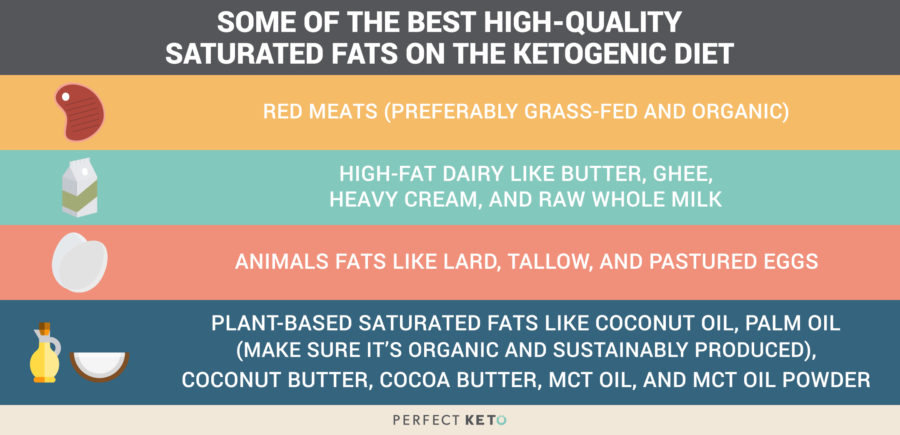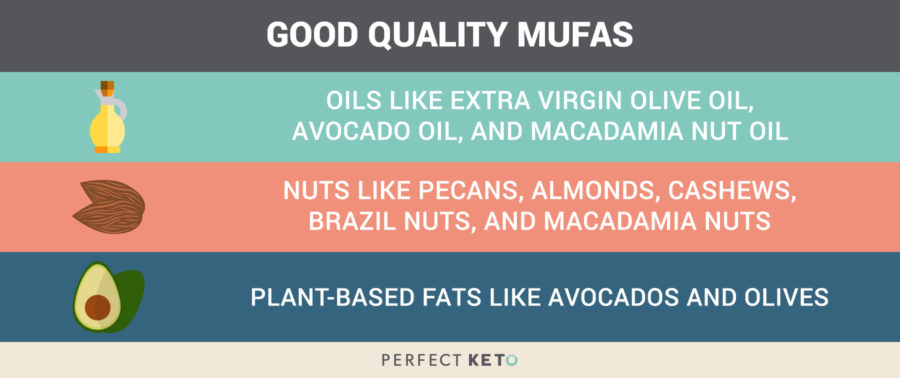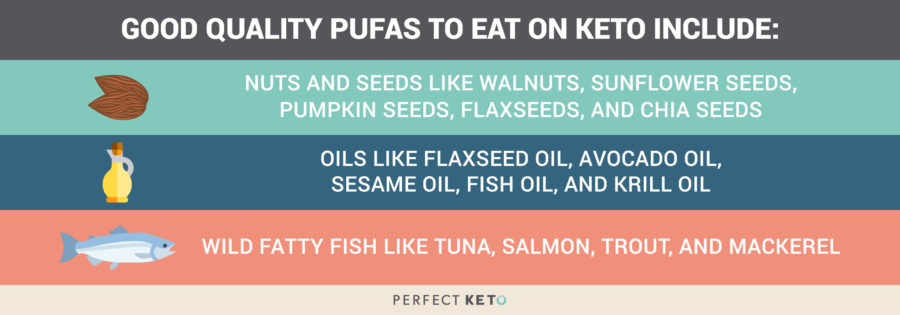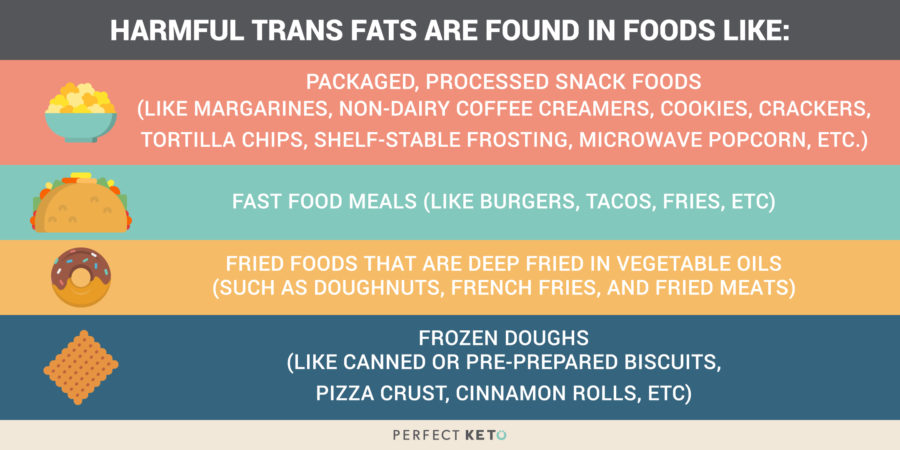If you’re on a low-carb diet or considering a keto lifestyle, then you might be thinking about dietary fat. You might also be wondering if healthy fat foods exist.
That’s because fat was demonized for years. The old idea that high-fat diets were linked to sky-rocketing blood cholesterol levels, type 2 diabetes, high blood pressure, and increased risk of heart diseases had the public scrambling for low-fat foods.
But over the last several years, new information has emerged about the important role fat plays in a healthy diet. As science has learned, healthy fat foods can positively impact your overall health. It all depends on what kinds of fats you incorporate into your regular meal plan.
Healthy fat foods range from fatty fish (like mackerel and sardines) to pasture-raised red meat and grass-fed ghee. These food items are great fat sources and completely different from packaged foods filled with trans fats and sugar.
Good fats can help lower your blood sugar, prevent cardiovascular disease, and even promote weight loss.
Whether you’re in full ketosis or just want to consume fewer carbs and more healthy fats, this article is for you. Read on to discover the difference between saturated, monounsaturated, and polyunsaturated fats, plus which high-fat foods you should be eating.
What Are Saturated Fats?
Saturated fats are solid at room temperature and are generally sourced from animals. These fats come from foods such as steak, bacon, chicken, and eggs.
There used to be a prevailing assumption — advertised by the American Heart Association — that saturated fats cause high cholesterol, clogged arteries, poor heart health, and a host of other health problems.
However, recent studies have debunked this claim, showing no significant link between saturated fats and the risk of heart disease[*].
In fact, there are many benefits of including healthy saturated fats in your diet. Saturated fat can improve HDL and LDL cholesterol levels, maintain bone density, decrease inflammation, and support the creation of important hormones[*][*][*][*].
Sources of Healthy Saturated Fats
Saturated fats were once thought to cause heart disease, but the latest research has debunked this long-standing myth of the 20th century. Some of the most nutrient-dense foods you can consume on keto are made up of saturated fats, including grass-fed meat, coconut oil, and MCT oil.

MCT Oil
Medium-chain triglycerides (MCTs) are mostly found in coconut oil (and in smaller amounts in butter and palm oil), but they can also be taken in supplement form.
MCT oil is easily digested by your body as it passes directly to your liver to be immediately used for energy, making it your body’s preferred fuel source in ketosis[*]. MCTs are also a great support for fat loss and athletic performance.
Coconut Oil
When it comes to healthy fat foods or keto-friendly foods, it’s hard to beat coconut oil.
Coconut-derived products including coconut flour, coconut oil, coconut flakes, and coconut butter are excellent sources of saturated fats. They’re a great dairy substitute for those who are lactose intolerant or are following a vegan keto diet.
One ounce of coconut flour contains about 120 calories, 10 grams of fiber, 6 grams of net carbs, and 4 grams of protein. Coconut is also rich in key vitamins and minerals, including manganese, calcium, selenium, phosphorus, and potassium[*].
Grass-Fed Butter
Grass-fed butter is one of the most popular keto cooking fats thanks to its impressive nutrient profile. It won’t just turn your dishes deliciously buttery and decadent — it also delivers a decent amount of omega-3 fatty acids and CLA (conjugated linoleic acid)[*].
Grass-fed butter is a great source of butyrate, also known as butyric acid. Butyrate is a compound that has a bevy of health benefits. It’s the preferential energy supply for colon cells, and it may help fortify gut health, prevent cancer, and improve insulin sensitivity[*][*][*][*][*].
Grass-Fed Meat
While grain-fed cows eat corn and soy products, grass-fed cows live their whole lives on a pasture and forage diet[*].
Grass-fed meat contains fewer calories, more omega-3 fatty acids, and more conjugated linoleic acid (CLA) than grain-fed beef. CLA is known for its beneficial effects in the prevention and possible treatment of several diseases like obesity, diabetes, and cancer[*].
Unsaturated Fats: MUFAs and PUFAs
Unsaturated fats are liquid at room temperature and are divided into two categories: monounsaturated fatty acids (MUFAs) and polyunsaturated fatty acids (PUFAs). Monounsaturated fatty acids contain one double bond, which makes them liquid at room temperature, while polyunsaturated fats contain several double bonds in their chemical structure.
Sources of Healthy MUFAs
Unlike saturated fats, monounsaturated fatty acids (MUFAs) have been accepted as healthy for many years. Many studies have linked them to improved levels of HDL (good cholesterol), better insulin resistance, reduced belly fat, and reduced risk of heart disease[*].

Extra Virgin Olive Oil
A staple in the Mediterranean diet, olive oil is a healthy fat food loaded with good-for-you monounsaturated fats. It also contains vitamin E and vitamin K, two powerful antioxidants that will help to protect you from oxidative stress and free radicals[*][*].
One study found that healthy consumption of this heart-healthy fat can contribute to lower incidences of coronary heart disease and prostate and colon cancers[*].
To preserve all the goodness of olive oil, consuming it raw as a salad dressing is the best option. Cooking unsaturated fats leads to oxidation and to the loss of important nutrients and properties.
Avocados and Avocado Oil
There’s a reason why the healthy eating community adores avocados — it’s incredibly versatile and one of the most nutrient-dense foods available.
Avocados are the only fruit you can enjoy in abundance on the keto diet. They’re filled with dietary fiber, potassium, magnesium, and vitamins A, C, E, K, and B. In some studies, avocados have been shown to support cardiovascular health, weight management, and healthy aging[*].
Avocado oil is one of the few natural resources abundant in the compound beta-sitosterol, a phytosterol that has been shown to inhibit the division of cancer cells[*].
Almonds
Almond-derived products, like almond meal or almond flour, are common in keto recipes. They’re often used as a substitute for wheat flour.
One cup of almonds contains 24% of your daily value of iron, one of the most common nutritional deficiencies today. Because of the high fiber and healthy fat content, almonds are believed to benefit cardiovascular health and reduce the risk of diabetes. They also help decrease inflammation and oxidative stress[*].
To read more about nuts like cashews and macadamia nuts and their role in a keto diet, read this complete guide to nuts.
Sources of Healthy PUFAs
Like MUFAs, PUFAs are liquid at room temperature. They contain essential omega-3 and omega-6 fatty acids, which have benefits when consumed in the proper balance.
You should consume a 1:1 ratio of omega-3 and omega-6 fatty acids, but unfortunately many Western diets consume 10 times the amount of omega-6s to omega-3s. The right balance can reduce the risk of heart disease, stroke, and other diseases related to inflammation, while also aiding in brain health[*][*].

Flaxseeds and Flaxseed Oil
Two compounds make flaxseed unique: ALA and lignans. ALA is a short-chain, essential fatty acid, which has been reported to benefit various health conditions, including cardiovascular disease, hypertension, atherosclerosis, diabetes, cancer, arthritis, osteoporosis, and autoimmune and neurological disorders[*][*].
Flaxseed contains more lignans (an antioxidant) than any other plant on earth. Lignans have been shown to reduce the growth of cancerous tumors, especially those in the breast, endometrium, and prostate[*].
Chia Seeds
Chia seeds might be one of the trendiest healthy fat foods at the moment. They’re a great addition to your keto-friendly morning smoothie and a good source of healthy omega-3 fatty acids[*].
According to dietary guidelines, a single ounce contains 30% of your daily magnesium and 18% of your daily calcium. Plus, while they contain 12 grams of carbohydrates, their high fiber content leaves these little seeds with just 1 gram of net carbs.
Fatty Fish and Omega-3 Fatty Acids
Fatty fish like salmon is one of the best available sources of omega-3 fatty acids and probably one of the most popular healthy fat foods you can consume.
Fish contains two particular types of omega-3 fatty acids: eicosapentaenoic acid (EPA) and docosahexaenoic acid (DHA). These are known to support brain development and function[*].
Fish oil and krill oil supplements are also a good choice if you’re not eating fish regularly.
Krill oil contains additional nutrients like phospholipids, which contribute to cell health and integrity, and astaxanthin — a powerful antioxidant that promotes brain health[*].
Unhealthy Fats to Avoid
Partially hydrogenated oils and hydrogenated oils, also known as trans fats, were created in the early 1900s as a way to make unsaturated fats shelf-stable and solid at room temperature.

Hydrogenated and Partially Hydrogenated Oils
Hydrogenated and partially hydrogenated oils are found in processed products like cookies, crackers, margarine, and fast food.
Processed trans fats are very damaging to your health because they promote inflammation and can increase the risk of diseases such as heart disease and cancer. These “bad fats” also reduce HDL cholesterol while increasing LDL cholesterol.
There are some trans fats that exist naturally. These can be found in grass-fed meats and natural, high-fat dairy products like Greek yogurt, whole milk, cheddar cheese, and butter — but they’re not the same as harmful processed trans fats.
Processed and Heated Oils
Many extracted seed and vegetable oils are high in omega-6s, which can promote chronic inflammation. They’re typically made from GMO seeds and include corn oil, peanut oil, canola oil, grape seed oil, and soybean oil.
Healthy Fat Foods on Keto
Healthy fat foods are indeed a vital part of a healthy diet and can be of great help on your ketogenic journey. Choosing good fats like saturated fat, MUFAs, and PUFAs when you’re choosing what foods to eat is vital to ensure you’re getting the right kind of fuel for your body.
Opt for high-quality saturated fats from animal sources and unsaturated fats that aren’t processed, with an extra focus on good sources of omega-3s. Avoid processed trans fats, low-quality oils, or heated polyunsaturated oils.
There are many ways to introduce healthy fat foods to your diet. Add some slices of avocado as a side to your main course, or drizzle extra virgin olive oil over your keto veggies.
Want more? Check out these keto-friendly recipes that taste great and will help with your macronutrient goals and fat intake: